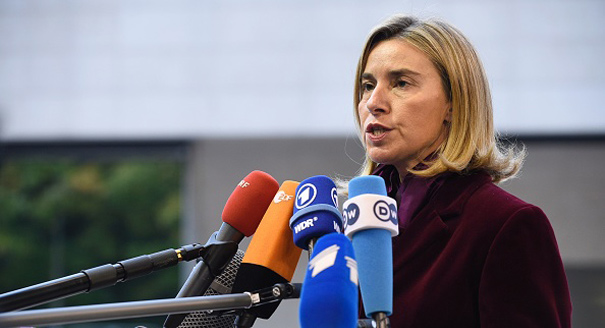After EU foreign ministers met in Luxembourg on October 17, they issued what are known as the meeting’s conclusions. These included a long list of items discussed by the ministers in a short space of time (less than seven hours). The conclusions covered Iraq, Ukraine, Libya, the so-called Middle East peace process, Bosnia and Herzegovina, and Mali. There were several sentences in which the EU was “deeply concerned” by or “strongly condemns” events.
The conclusions on Syria were long, detailed, and dispassionate. They stated that since the beginning of the current offensive against Aleppo by the Syrian regime “and its allies, notably Russia,” there had been “deliberate targeting of hospitals, medical personnel, schools and essential infrastructure, as well as the use of barrel bombs, cluster bombs, and chemical weapons.”
The EU, the conclusions went on, “condemns the continued systematic, widespread and gross violations and abuses of human rights and all violations of international humanitarian law by all parties, particularly the Syrian regime and its allies.”
But in diplomatic, political, and even humanitarian terms, with few exceptions, Europe’s role in trying to ease the suffering in Syria has been pitiful. That is not only because Europe lacks the hard power to stop the fighting or to back certain factions or movements. Europe’s soft power in support of Lebanon and Jordan, which have been overwhelmed by refugees fleeing the war in Syria, has also been too little, too late.
If anything, the ministers’ conclusions confirm the powerlessness of the EU’s role in Syria. And if and when the war is over, the EU will try to redeem itself by throwing money at the country, just as it did in the Western Balkans after the war in the former Yugoslavia finally ended in 1999 and in Afghanistan.
“Only once an inclusive political transition is in place [in Syria],” the conclusions stated, “will the EU be able to assist with the reconstruction of the country directly and through international organisations, an EU objective that will enable the millions of Syrians who have been forced to flee their homes to return to them and live in peace and security in their own lands.”
It’s as if the refugee crisis will simply evaporate and Syria will be able return to stability and normality. It’s as if the EU can then resort to using its soft-power tools, this time by mobilizing massive funds and providing extensive humanitarian and reconstruction assistance to rebuild a country and society devastated by war and brutality.
Yet the EU’s soft power, which is also about crisis management, is no longer the attraction it once was—even for the member states.
Poland and particularly Hungary conflate soft power with Europe’s liberal values. These values do not just cover human rights, media freedom, the rule of law, and accountability. They also relate to other specific EU values, especially the free movement of people and access by all member states to the EU single market. These sets of values have made the EU attractive to its members as well as to those countries aspiring to join the bloc.
But even these soft-power tools were not sufficiently attractive to persuade a majority of Britons to vote to remain in the EU in the UK’s June 23 referendum on EU membership. A country that had not shied away from using hard power in the past rejected the soft power of the EU and all the advantages of belonging to a powerful trading bloc anchored on essential freedoms and values.
This rejection of the EU’s soft power has also become conflated with the refugee and migration issues. Under a relocation scheme, the European Commission, the EU’s executive, had asked member states to accept a fair share of refugees commensurate with the size of their country, a request that several governments rejected even though it was a humanitarian response to the war in Syria.
That humanitarian support—one of the main instruments of the EU’s soft power—was dismissed by those Britons who campaigned to leave the EU, and by other EU governments. Soft power was equated with Europe opening its doors to refugees and migrants without putting in place a common refugee and asylum policy and the infrastructure to cope with them. Some member states also equated this kind of soft power with the undermining of their sovereignty.
This changing view of soft power and the reluctance of the EU as a bloc to use hard power are not sustainable in the long term. An end to war and instability in the Middle East is not in sight. Russia’s growing military influence in the region is set to continue, particularly because neither the EU nor the United States has the political will to counter Russia’s long-term strategy there.
It will require a major reassessment by EU leaders of the use and merits of soft power if the EU wants to make a difference inside and outside the bloc. For now, the conclusions that EU foreign ministers signed up to on October 17 are toothless.






